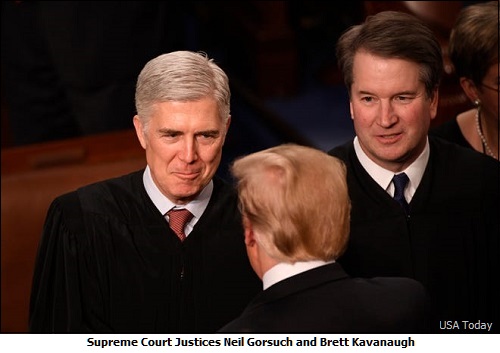
|
|

|
|
| April 18, 2024 |
|
Supreme Court to rule on shielding Trump's finances 
WASHINGTON - The Supreme Court on Friday agreed to conduct full reviews of three cases that will decide whether President Donald Trump may continue shielding his personal tax and financial data from Congress and a New York City prosecutor.
Moving to issue the final word on lawsuits with constitutional separation-of-powers and federalism stakes, the court said it would hear arguments in March. That timetable sets the stage for rulings in June, amid the height of the 2020 presidential election. The decision came hours after the Democratically-controlled House moved toward a final vote next week on impeaching the first-term Republican president. Although the judicial and congressional actions aren't directly linked, Chief Justice John Roberts would preside over a likely Senate impeachment trial in January. Trump's lawyers asked the high court to intercede on his behalf in the three cases after an unbroken string of losses in federal district and appeals courts. The Supreme Court represents the president's last hope to protect the documents from being released by banks and accounting firms as he seeks re-election. The justices agreed to weigh in on Trump's opposition to three distinct investigations: • Manhattan District Attorney Cyrus Vance issued grand jury subpoenas to the Trump Organization in August as part of a criminal investigation of hush-money payments to two women claiming past affairs with Trump, which he has denied. Vance also subpoenaed Mazars USA, Trump's longtime accounting firm, in September seeking eight years of his tax returns. Two lower federal courts upheld the subpoenas. • The House Committee on Oversight and Reform issued a subpoena to Mazars USA, Trump's accounting firm, in April seeking financial records from the president, his family business, a trust and the company that runs Trump International Hotel in Washington, D.C. Trump's former personal lawyer, Michael Cohen, testified before Congress that Trump routinely overstated or understated his holdings for financial gain. Again, two federal courts have ruled against the president. • The House Financial Services Committee and Intelligence Committee issued subpoenas to Deutsche Bank and Capital One Financial Corp. in April seeking records from Trump, his three oldest children and the Trump Organization. The panels are probing risky lending practices by major financial institutions and efforts by Russia to influence U.S. elections. As with the other cases, Trump is 0-for-2. "These are fairly monumental questions," Professor Michael Gerhardt, an expert on constitutional conflicts between presidents and Congress at the University of North Carolina School of Law, said before Friday night's announcement by the high court. 'Is he above the law?' A USA TODAY analysis in 2016 of legal filings across the United States found that Trump and his businesses had been involved in at least 4,000 legal actions in federal and state courts over three decades, ranging from million-dollar real estate battles to personal defamation lawsuits. The three cases involving his tax and financial records aren't even the latest. Just this week, federal appeals courts in the District of Columbia and Richmond, Va., heard Justice Department challenges to lawsuits filed by Democrats in Congress and two attorneys general that claim Trump violated the Constitution by profiting from official foreign and domestic visits to his hotels and other properties. "It really goes to the question, is he above the law?" Judge James Wynn of the U.S. Court of Appeals for the 4th Circuit said Thursday. In between those two hearings, a federal judge in Texas issued a nationwide injunction against the administration's use of up to $3.6 billion in military construction funds to build a wall along the Mexican border. The administration has asked the justices for emergency stays of lower court actions more than 20 times in three years, compared to eight times in the previous 16 years, according to a Harvard Law Review article by University of Texas School of Law professor Stephen Vladeck. Despite the court's conservative tilt, the result has been mixed. The court upheld Trump's travel ban against several majority-Muslim nations on his third try last year, but it blocked his effort this year to put a citizenship question on the 2020 census. Now it is weighing his effort to wind down the Deferred Action for Childhood Arrivals program, which has provided a reprieve for some undocumented immigrants brought to the United States as children. The cases involving Trump's tax returns and financial documents might not be the most consequential facing the justices, who have disputes over gay rights and gun rights, abortion and religion on their docket. But they may be the most controversial. (Source: USA Today) Story Date: December 14, 2019
|